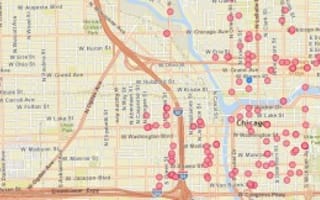
In a push to make its data more accessible to the public, Chicago launched an OpenGrid web app yesterday that lets residents look up city data on crime, street closures, city service requests, food inspections, and more. The app displays relevant data points on a map, letting users click individual points to see more information about the data they’re looking for. The app is open source and has an open API, so expect to see developers making creative use of the data in upcoming months.
Unfortunately, finding information in the app does require some experimentation, since users need to know what they're looking for in order to find it. Here’s a quick guide to how you can look up some interesting data in the app.
Getting started
When you first access the OpenGrid app, you’ll be brought to a main screen with a map of the city. From there, you choose what data you want to see.
To do so, choose “Advanced Search” from the top right menu. For each search you make, you can select a search area under “Additional/Geo-spatial Filters” either by using your device's geolocation data, or by searching within city limits or by zip code. You can also drop a pin or draw a selected area on the map.
One good place to start would be to look up food inspection data.
To look up food establishments that recently failed inspections
Under “Datasets and Standard Filters” in the advanced search menu, click “Add dataset” and select “Food Inspections” in the dropdown box that shows up. A new dropdown menu will show up. In the new box, select “results” equal and enter the filter value “Fail.” (The search is case sensitive, so be sure to capitalize.) If you want to include restaurants that passed only conditionally, select not equal “Pass.”
Then choose how far back you want the data to go by clicking “Add rule” and selecting “inspection_date” from the dropdown menu. Next to “inspection_date,” a new dropdown menu will show up. Select greater or equal, click “enter filter value” and choose a start date from the calendar that pops up.
Finally choose the location filter you want to use and click “Submit.”

Voila. Click the red dots to decide for yourself whether the violation is severe enough to reconsider your patronage.
To look up who’s filming in Chicago
Under “Existing Queries,” choose “Filming Locations” from the “Commonly used queries”-menu. If you only want to see recent or coming filmings, add a rule for “applicationstartdate” and select greater or equal to however far you want to go back. If you look carefully, you’ll find applications from Walt Disney Studios, along with countless Chicago PD tapings.
As a final tip, if you don’t know exactly how to find what you’re looking for, pick a data set, add a rule search for not equal, and type in some random letters. Then click and read through the data points the map brings up to find out what search terms you could be using.
That should be enough to get you started with digging for stuff you’re wondering about in the data set. Since the OpenGrid project is built on an open source model, expect to see new functionality and bug fixes trickling in over time. Until then, happy searching!
Images via OpenGrid.
Know of a startup that we should be covering? Send us an email at [email protected].






